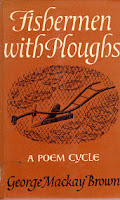In a world that seems to have lost any sense of cosmic scale, reading a poem cycle that features such a great sweep of time, stretching back to ancient history and to the recesses of legend and myth, is an uncanny, unfamilarising experience. One gets the rare sense of a community whole, portrayed from its early beginnings, sailing west out of Norway in the ninth century, through Reformation and annexation to Scotland, and painfully struggling for material improvement over the centuries -- until the hubris of progress and materialism, after having drained the land of its people and left only ruins and the detritus of modern commodities in its wake, ultimately leads to nuclear holocaust. The few people who survive the disaster return, ‘unchanged yet terribly changed’, to their original settlement and occupation at the dawn of time:
‘The great song must begin all over again, very far back, beyond the oxen and millstones and bronze throats of agriculture’.
Not that I can fully endorse the view that only through ecological apocalypse and a return to some lost origin can the human race survive. Yet there are moments, like the present one, when I cannot but sympathise with this escapist metaphor that pervades Fishermen with Ploughs and all of George Mackay Brown’s work for that matter: the small island as that quintessential imaginary place one must get to in order to rebuild one’s life, to reinvent oneself -- and to forget all the sad, terrible things human beings can do to each other and to their communities.
 |
Hoy, Orkney Islands, Scotland http://www.geograph.org.uk/photo/314858 |
A ship called Dove sails west out of Norway in the ninth century carrying a tribe of fisher people. Their god, the beautiful Balder, is dead. They are in flight from starvation, pestilence, turbulent neighbours (what the poet calls, in the shorthand of myth, the Dragon). But also they are compelled west by the promise of a new way of life: agriculture. The cargo in their hold is a jar of seed corn. Fate, blind and all-wise, has woven their myth about them. Now the same Fate sits at the helm.
That is the theme of the opening section of the poem.
The people settle in a valley called Rackwick in the Orkney island of Hoy. Their slow evolution through the centuries occupies the next four sections; how the climate of their existence changed with such things as the Reformation, annexation to Scotland, foreign wars, compulsory education. But essentially their lives were unchanged; the same people appear and reappear through many generations - the laird, the crofter fisherman, the shepherd, the tinker, the beachcomber, and the women who watch the sea with stony patience; all are caught up in 'the wheel of bread' that is at once brutal and holy.
There is a slow sure improvement in the material conditions. Why does the wheel slow down and stop (Part V)? By the middle of this century the valley was almost completely depopulated. Perhaps (the poet argues) the quality of life grows poorer as Progress multiplies its gifts on a simple community. The dwellers in islands are drawn to the new altars. The valley is drained of its people. The Rackwick croft ruins are strewn with syrup tins, medicine bottles, bicycle frames, tattered novels, rubber boots, portraits of Queen Victoria.
In Part VI the Dragon, black pentecostal fire, falls on a great city. Once again a few people escape by boat. They return to the valley. Their most precious possession is the sacred corn sack. They make themselves farmers and fishermen. The women return, unchanged yet terribly changed. But the wheel has been wrenched from the axle-tree. The great song must begin all over again, very far back, beyond the oxen and millstones and bronze throats of agriculture.
--George Mackay Brown, Fishermen with Ploughs (1971) in The Collected Poems of George Mackay Brown, eds. Archie Bevan and Brian Murray (London: John Murray, 2005), pp. 89-90.

No comments:
Post a Comment